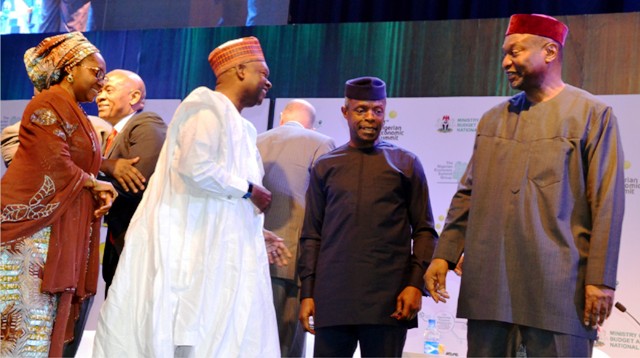Business
Economic Summit: Minister Assures On ERGP Implementation

Minister of Budget and National Planning, Senator Udo Udoma has said that Federal Government was committed to the faithful implementation of the Economic Recovery and Growth Plan (ERGP) 2017-2020.
ERGP was launched by President Muhammadu Buhari on April 5.
Udoma said this in Abuja at the opening of the 23rd Nigerian Economic Summit (NES) with the theme “Opportunities, Productivity and Employment; Actualising the ERGP’’
He said that so many Nigerians had expressed concern about whether the plan would be properly implemented, given Nigeria’s past record with previous plans.
“I appreciate these concerns. This Government is committed to the faithful implementation of the ERGP.
“It is for this reason that this year’s Summit is dedicated to the implementation of the ERGP.
“ We cannot and must not allow it to fail.
“At this Summit, we will be expecting the active participation of all the private sector persons gathered here in reviewing and strengthening our implementation strategies,’ the minister said.
Udoma said the summit would give an opportunity for the gathering of captains of industry and influential members of the private sector to contribute toward the effective implementation of the ERGP.
He said that the Federal Government would ensure that annual budgets align with the ERGP so that government spending would be driven by the plan.
The minister said that the government had set up a special implementation unit to ensure effective delivery of the Plan and had also engaged staff to drive the process.
“In the coming weeks, we will be running sector-focused Malaysian style labs.
“The labs are intended to bring all relevant stakeholders into weeks of intensive working sessions, to brainstorm on practical steps to overcoming identified challenges in the selected area.
“The central objective of the labs will be to bring in private capital to finance projects across the country.
“We will be inviting many of you to participate in these labs.
“ Some of the staff we have retained will be available in the course of the Summit to interact with you and give you more information on the proposed labs as well as all our implementation initiatives.
Also, Mr Kyari Bukar, Chairman of Nigerian Economic Summit Group (NESG) said the summit had become a platform to discuss and understand economic policies in the country, for the past 23 years.
Transport
Automated Points Concession : FAAN Workers Gave 72hrs To Revise Decisions In PH

Transport
FAAN Announces Pick-Up Points for Go-Cashless Cards

Business
Fidelity Bank To Empower Women With Sustainable Entrepreneurship Skills, HAP2.0
-

 Politics3 days ago
Politics3 days agoSenate Urges Tinubu To Sack CAC Boss
-

 News3 days ago
News3 days agoAmend Constitution To Accommodate State Police, Tinubu Tells Senators
-

 News3 days ago
News3 days agoDisu Takes Over As New IGP …Declares Total War On Corruption, Impunity
-
Business4 days ago
Crisis Response: EU-project Delivers New Vet. Clinic To Katsina Govt.
-
Business4 days ago
President Tinubu Extends Raw Shea Nuts Export Ban To 2027
-
Business4 days ago
President Tinubu Approves Extension Ban On Raw Shea Nut Export
-
Sports3 days ago
NDG: Rivers Coach Appeal To NDDC In Talent Discovery
-
Business4 days ago
Fidelity Bank To Empower Women With Sustainable Entrepreneurship Skills, HAP2.0

